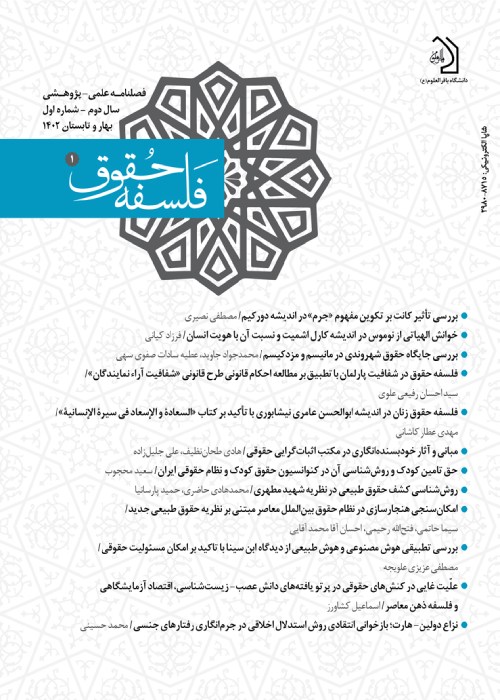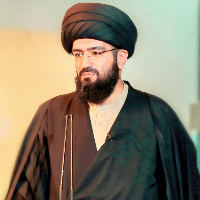The philosophy of law in the transparency of the parliament by complying with the study of the legal plan "Transparency of the ballots of the representatives" provisions
Author(s):
Article Type:
Research/Original Article (بدون رتبه معتبر)
Abstract:
The aim of the current research is to explain the desirable nature of parliament's transparency and its theoretical challenges in contemporary Iranian constitutional law based on the philosophical findings of modern law in relation to constitutional jurisprudence. The research method hired, has been qualitative and the analytical philosophy in contemporary law in response to how the right to transparency is made available, that believes the possibility of having enough information for four answers in the public domain is equal to guaranteeing transparency. Who are the decision makers? How are they chosen? Based on what principles do they make decisions? And the benefit of the decisions taken will be given to which group or people? Accordingly, in a completely transparent parliament, the following should be organized to guarantee these questions: transparency of processesand decision-making methods, transparency of priorities and policies, transparency of documents and reports, audio-visual and interactive access to the ballots of parliament members and technological access to data, transparency of properties and maintenance costs and the cost of human resources, financial transactions of members and administrative expenses, transparency regarding guests and current expenses, the cost of occasions, events and trips, transparency of members' information, transparency of parliamentary proceedings and complaints. Criticisms, in any other words, intellectual challenges that this philosophical level can be useful for legislative operations have been raised by some schools of public choice and behavioral economics, believing that: transparency causes people to move away from specialized decisions and get absorbed in the currents of interests and extreme populism. On the other hand, the implementation of transparency is very costly and of little use. The critical response to the mentioned challenge firstly, believes however, all political rights are very costly, in principle, its necessity for the society cannot be denied. On the other hand, although there is a possibility of extreme populism, transparency can be precisely opposed to the above-mentioned importance and prevent populism with the guarantees of the profession in the way it is implemented and based on its basic philosophical principles. In fact, the aforementioned criticism is meant more than a definite criticism in the prohibition of transparency but a clear attention to guaranteeing the dimensions of philosophical transparency. Also, for its function and purpose (regarding providing acceptability and legitimacy for political representation), the oath of allegiance is considered parallel to the theory of representation in public law, which is totally considered the basis of parliament in modern law. One of the essential requirements in the philosophy of Islamic law in the contract is the absence of jeopardy in the acts of guardianship, and the guardian is obliged to clarify the limits and quality of his expediency in the acts of guardianship. On the one hand, in the practice of governance in public affairs in Islam, observing the right and the rightness is one of the urgent and necessary matters that the Shariah is not satisfied with leaving it aside, and the rightness in the contract of guardianship is necessary for transparency in many cases, and therefore the philosophy of Islamic law can include the issue that Parliament should be transparent. On the other hand, the interpretive originalism considering the interpretation of the text of the constitution according to the opinion of the Constituent Assembly, shows by examining the text of the constitution that the constitution of the Islamic Republic also supports the issue of transparency. The result of the review of the provisions provided in the legal plan depicts that if they are approved, the Islamic Council will not be able to be transparent, and many transparency provisions in this plan have been left incomplete and neglected.
Keywords:
Language:
Persian
Published:
Journal of Philosophy of Law, Volume:2 Issue: 1, 2024
Pages:
73 to 98
magiran.com/p2687515
دانلود و مطالعه متن این مقاله با یکی از روشهای زیر امکان پذیر است:
اشتراک شخصی
با عضویت و پرداخت آنلاین حق اشتراک یکساله به مبلغ 1,390,000ريال میتوانید 70 عنوان مطلب دانلود کنید!
اشتراک سازمانی
به کتابخانه دانشگاه یا محل کار خود پیشنهاد کنید تا اشتراک سازمانی این پایگاه را برای دسترسی نامحدود همه کاربران به متن مطالب تهیه نمایند!
توجه!
- حق عضویت دریافتی صرف حمایت از نشریات عضو و نگهداری، تکمیل و توسعه مگیران میشود.
- پرداخت حق اشتراک و دانلود مقالات اجازه بازنشر آن در سایر رسانههای چاپی و دیجیتال را به کاربر نمیدهد.
In order to view content subscription is required
Personal subscription
Subscribe magiran.com for 70 € euros via PayPal and download 70 articles during a year.
Organization subscription
Please contact us to subscribe your university or library for unlimited access!



